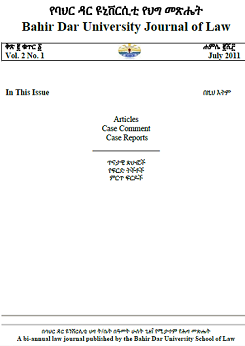Criminal Jurisdiction of States over Hijackers of Aircrafts under the Hague Convention: Implications for Ethiopia
Abstract
The aviation technology faced serious problems as of the 1960s. The most heinous of the problems has been the crime of hijacking of aircraft. Because of the severity of this crime, the international community responded to it, inter alia, by international Conventions, the most important one being the Hague Anti-hijacking Convention of 1970. This article is aimed at investigating the relevant provisions of the Convention on criminal jurisdiction of States Parties to the Convention. More specifically, the article analyzes issues regarding the assumption of criminal jurisdiction of States parties, the obligation of states parties in connection with prosecution and/or extradition of hijackers, the status of extradition under the Convention, conflict of criminal jurisdiction of states and the implication of the provisions of the Convention, on criminal jurisdiction, to Ethiopia – a party to the Convention as of 1979.
In this piece, the author argues that the Hague Convention has left some critical questions unanswered though it contains several praiseworthy provisions on criminal jurisdiction of states. Specifically, the Convention does not clearly define the constituent elements of the crime under consideration; nor does it contain rules regulating conflict of criminal jurisdiction of states with regard to prosecution and/or extradition of hijackers. In general, it is hoped to show that the Hague Convention contains inbuilt deficiencies that must be rectified so as to effectively combat the crime of hijacking.
